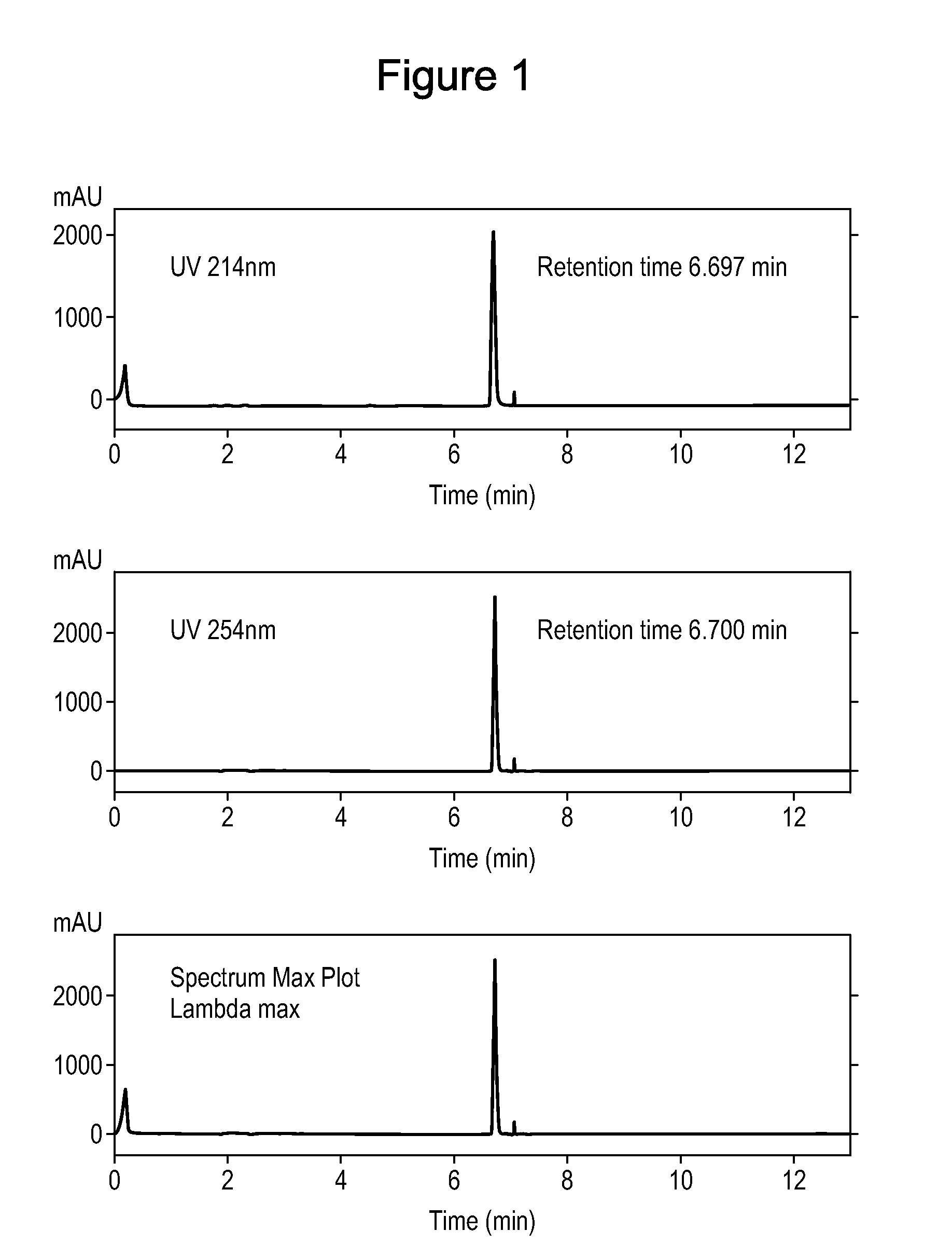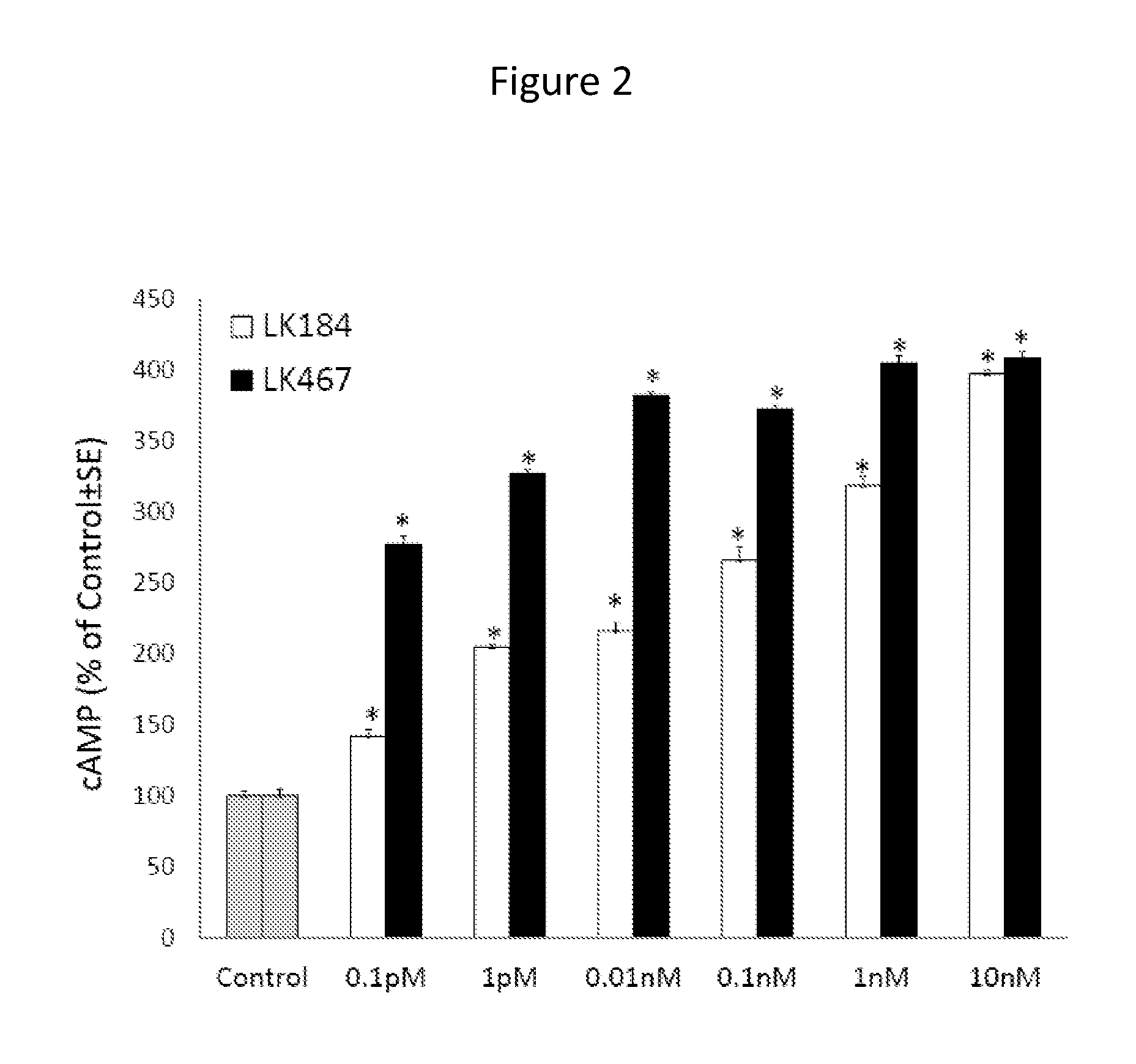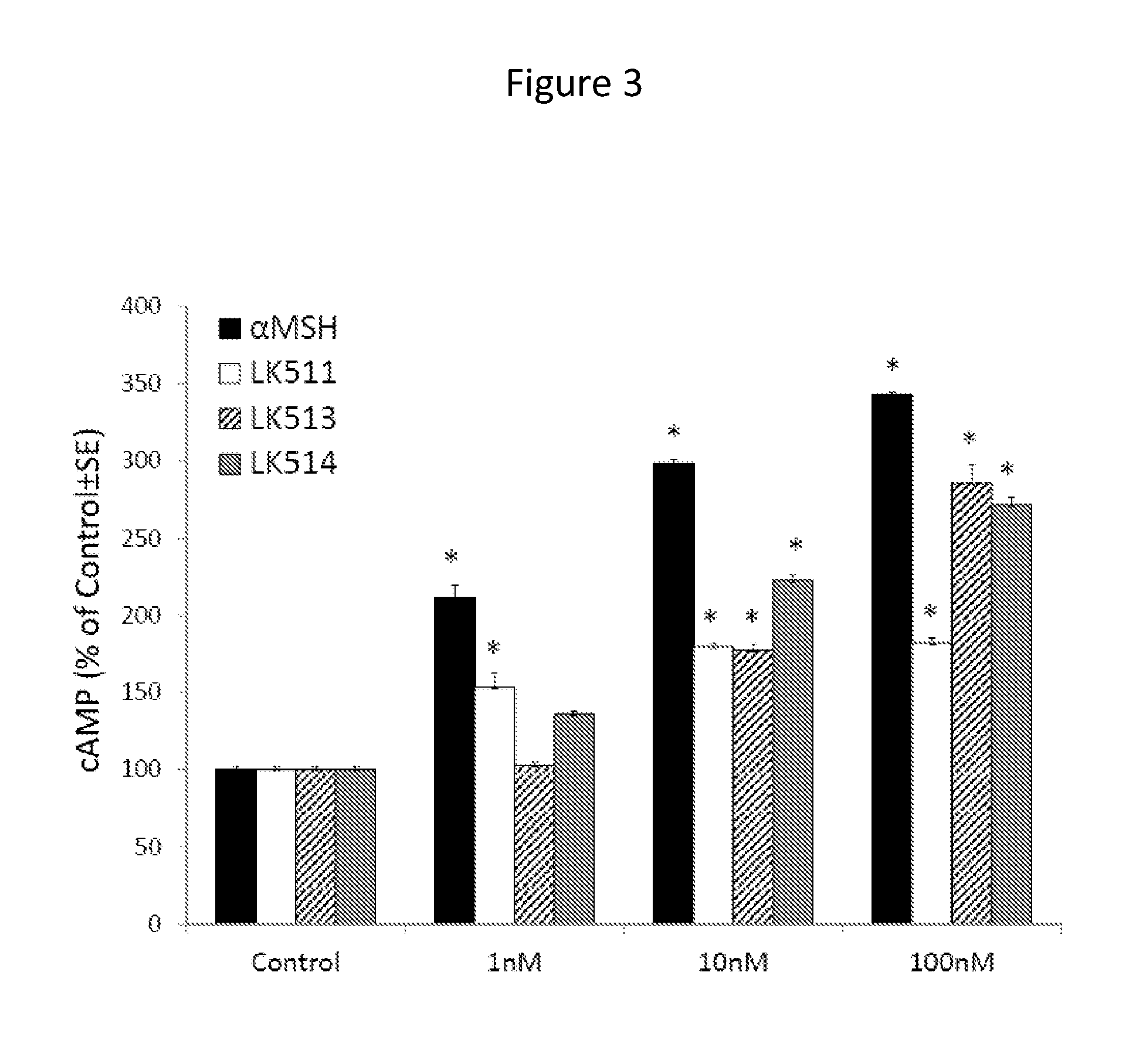Skin care compositions and methods comprising selective agonists of melanocortin 1 receptor
a technology of melanocortin and composition, applied in the direction of drug composition, peptide/protein ingredients, peptides, etc., can solve the problems of undesirable streaking or blotchy appearance, hazardous effects of practice, and various problems with current formulations
- Summary
- Abstract
- Description
- Claims
- Application Information
AI Technical Summary
Benefits of technology
Problems solved by technology
Method used
Image
Examples
example 1
Selectivity of Peptide Agonists for Human Melanocortin 1 Receptor (hMC1R)
[0120]Receptor selectivity of peptide agonists for hMC1R was determined by stimulation of cAMP in heterologous cells expressing different human melanocortin receptors (MC1R, MC3R, MC4R, and MC5R). Tested peptides included the following: melanotan II (MT-II), alpha melanocortin stimulating hormone (α-MSH), LK-184 (Ph(CH2)3CO-His-(D-Phe)-Arg-Trp-NH2), LK-467 (Ph(CH2)3CO-His-(D-1-Nal)-Arg-Trp-NH2), LK-511 (Ph(CH2)3CO-His-(D-4-Bip)-Arg-NH2), LK-513 (Ph(CH2)3CO-His-(D-4-Bip)-Arg-NHMe) and LK-514 (Ph(CH2)3CO-His-(D-4-tBuPhe)-Arg-NH2). Results are shown in Table 1 below:
[0121]
TABLE 1Melanocortin Receptor SelectivityHMC1RHMC3RHMC4RHMC5REC50% MAX.EC50% MAX.EC50% MAX.EC50% MAX.(NM)ACTIVITY(NM)ACTIVITY(NM)ACTIVITY(NM)ACTIVITYMT-II3.57103———— 51.66100 α-MSH—— 6.11100 16.0100——LK-1840.1912822.785 1.69102262.339LK-4670.3411132.4 718.1 39122.034LK-5111.4688INACTIVELK-5133.2795EC50 > 10000 (2-7% MAX. ACTIVITY)LK-5143.6594
[0122...
example 2
Peptide Stability
[0123]LK-513 (Ph(CH2)3CO-His-(D-4-Bip)-Arg-NHMe) was tested for stability and degradation over a storage period. The peptide was stored in a lyophilized form in open air at room temperature for 4 months. After 4 months, HPLC was performed on a test sample of the peptide in order to measure degradation, using standard methods (FIG. 1). The peptide is highly stable and resistant to degradation, showing only a single HPLC peak. Without being bound by theory, it is believed that the enhanced stability is a product of the absence of amide bonds between natural L-L-amino acids in the tripeptides and the existence of only one amide bond between natural amino acids in the tetrapeptides (Arg-Trp). Amide bonds between non-natural D- and natural L-amino acids are less prone to chemical and enzymatic hydrolysis, as evidenced by the FIG. 1. Further, the bulk and hydrophobicity of the X4 amino acid (D-Phe or a bulky hydrophobic analog thereof, such as D-4-Bip in the case of LK-51...
example 3
Dose-Dependent Stimulation of cAMP in Human Melanocytes
[0124]Peptides were tested on cultured human melanocytes for their capacity to activate MC1R, as measured by stimulating cAMP formation. After 45 minutes of treatment with different concentrations of peptides, cAMP levels were measured using a I125-labeled radioimmunoassay kit. Tetrapeptide LK-467 proved to be more potent than LK-184 in stimulating cAMP formation, resulting in maximal levels of cAMP at a concentration of 0.1 nM, compared to 10 nM of LK-184 (FIG. 2). Tetrapeptide LK-487 was equipotent to LK-467 in this assay (data not shown). The tripeptides LK-511, LK-513, and LK-514 were about ten times less potent than α-MSH in increasing cAMP formation, with LK-514 being more potent than LK-511 or 513 (FIG. 3). These results demonstrate that these small peptides have remarkable potency to activate the MC1R.
PUM
| Property | Measurement | Unit |
|---|---|---|
| concentration | aaaaa | aaaaa |
| concentration | aaaaa | aaaaa |
| concentration | aaaaa | aaaaa |
Abstract
Description
Claims
Application Information
 Login to View More
Login to View More - R&D
- Intellectual Property
- Life Sciences
- Materials
- Tech Scout
- Unparalleled Data Quality
- Higher Quality Content
- 60% Fewer Hallucinations
Browse by: Latest US Patents, China's latest patents, Technical Efficacy Thesaurus, Application Domain, Technology Topic, Popular Technical Reports.
© 2025 PatSnap. All rights reserved.Legal|Privacy policy|Modern Slavery Act Transparency Statement|Sitemap|About US| Contact US: help@patsnap.com



